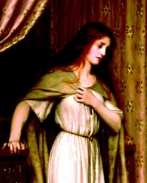Hrm. A PS to the Last
Sarah, it seems, does not share my opinions. It is not, by any stretch, a normal movie; I suppose I should have given more of a review. By saying "one of Story's finest hours" I mean not that it is an excellent story itself, but that it is about stories and authorship. Spoilers lurk below.
Part of its charm, to me, is that it is wildly unrealistic and yet, to use an annoying but helpful bit of grammar, Realistic. It's a fairy tale - a bedtime story. The basic thrust of the plot is simple, the characters are iconic, the conflict is basic. But this is a fairy tale meant to make a point about fairy tales, so it contains plenty of food for thought. [Obviously, if you don't like literature being self-referential, this is not for you :).]
It's about the inspiration of stories: There is an author, for whose inspiration a certain muse (whose name is Story) has been sent. Then, we are told, the work of the author will be the inspiration for another man to effect great, good change. In broader terms, it is about everyone, not just writers, maintaining their link in the chain of events. To be able to do this, they must realize that there is a Story being told in which they are characters, each with a distinct role and purpose. [The presence of an Author is not directly addressed but can be sensed. There is someone watching out for the characters and telling the story. In this movie, as in Signs, Shyamalan has cast himself in the role of God.]
The tragedy of the critic is that he didn't get any of this. He believed that things like romantic reunions in the rain are just trite lies that we tell ourselves via story - such things have no basis in fact, not even symbolically. He missed the Real in looking at the real. So when he found himself in the midst of the Story, he misunderstood the characters and the plot. Using his supposed knowledge, he gave bad advice to our heros. And when he found himself face to face with an Enemy, all he could do was comfort himself with trite lies he didn't believe.
That, at least, is the essence I came away with.
Part of its charm, to me, is that it is wildly unrealistic and yet, to use an annoying but helpful bit of grammar, Realistic. It's a fairy tale - a bedtime story. The basic thrust of the plot is simple, the characters are iconic, the conflict is basic. But this is a fairy tale meant to make a point about fairy tales, so it contains plenty of food for thought. [Obviously, if you don't like literature being self-referential, this is not for you :).]
It's about the inspiration of stories: There is an author, for whose inspiration a certain muse (whose name is Story) has been sent. Then, we are told, the work of the author will be the inspiration for another man to effect great, good change. In broader terms, it is about everyone, not just writers, maintaining their link in the chain of events. To be able to do this, they must realize that there is a Story being told in which they are characters, each with a distinct role and purpose. [The presence of an Author is not directly addressed but can be sensed. There is someone watching out for the characters and telling the story. In this movie, as in Signs, Shyamalan has cast himself in the role of God.]
The tragedy of the critic is that he didn't get any of this. He believed that things like romantic reunions in the rain are just trite lies that we tell ourselves via story - such things have no basis in fact, not even symbolically. He missed the Real in looking at the real. So when he found himself in the midst of the Story, he misunderstood the characters and the plot. Using his supposed knowledge, he gave bad advice to our heros. And when he found himself face to face with an Enemy, all he could do was comfort himself with trite lies he didn't believe.
That, at least, is the essence I came away with.
 ....
....
